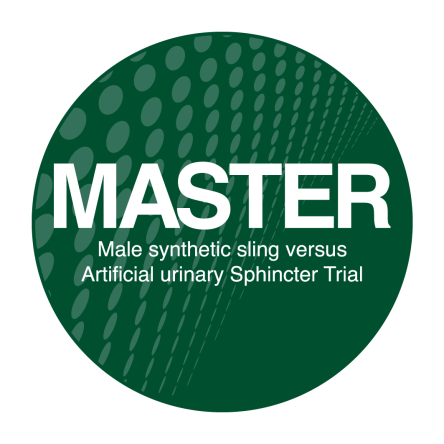Stress urinary incontinence (SUI) is common in men after prostate surgery and can be difficult to improve with conservative treatment. Even after physiotherapy, 75% of those incontinent 6 weeks after surgery continue to have some leakage 12 months later. Implantation with the artificial urinary sphincter (AUS) is the recommended surgery for persistent SUI but requires adequate patient dexterity to operate, specialist surgical skills, is relatively expensive and may require revisions over time. New surgical approaches have been sought, with the male synthetic sling emerging as a possible alternative, but randomised controlled trial (RCT) comparison with AUS is lacking.
The aim of MASTER was to compare the clinical and cost effectiveness of male synthetic sling with AUS surgery in men with persistent SUI after prostate surgery.
MASTER was a multi-centre, non-inferiority RCT which included a parallel non-randomised cohort (NRC) and an embedded qualitative component.
Men with urodynamic stress incontinence after prostate surgery, for whom surgery was deemed appropriate, were included. Men were excluded if they had a previous sling or AUS surgery, unresolved bladder neck contracture or urethral stricture, or unable to give informed consent or complete questionnaires.
A total of 380 men were randomised to either the male sling or AUS surgery and 100 men were included in the NRC, from 28 hospitals across the UK.
The primary clinical outcome was patient-reported continence at 12 months post randomisation (with a non-inferiority margin of 15%), using a composite outcome from two questions (“How often do you leak urine?”, and “How much urine do you leak?”) in the validated ICIQ-UI short form questionnaire. The primary economic outcome was cost-effectiveness assessed by incremental cost per quality adjusted life year, at 24 months after randomisation.
Secondary outcomes included op- and post-op details, complications, readmissions, general health and satisfaction with treatment. Men completed questionnaires at baseline, 6 months after surgery and 12 and 24 months after randomisation and invited for a clinical review 12 months after their surgery. Men in the NRC completed postal questionnaires at baseline, 6 months after surgery and 12 and 24 months after entering the study.
While few men were completely ‘cured’ of their SUI, the results of the MASTER found the male sling was non-inferior to the AUS, with participant reported continence rates and symptoms similarly improved in both groups, at 12 months post randomisation. Quality of life scores improved, and satisfaction with surgery was high in both groups. There were few serious adverse events (n=6 and n=13 in the sling compared to the AUS). Whilst the primary outcome showed that the male sling was non-inferior to the AUS, secondary outcomes showed statistically significant differences favoured the AUS. Men in both groups were generally satisfied with their improvement and accepted that although their SUI was not cured, there was sufficient improvement for them to be satisfied. Outcomes of the NRC were similar.
More details of the 12 month outcomes of MASTER have recently been published in European Urology, https://authors.elsevier.com/sd/article/S0302-2838(21)00063-4. The full monograph report to funder for outcomes of MASTER up to 24 months, was submitted in November 2020. A paper outlining these 24-month outcomes is currently in progress for submission to a peer reviewed journal in the coming months.
We are also awaiting on the outcome of two additional funding request to further follow up the MASTER participants pain symptoms and outcomes at least 5 years after their MASTER surgery.
MASTER was supported by a grant from the National Institute for Health Research (NIHR) Health Technology Assessment (HTA) Programme (Project Number 11/106/01).
For more information please contact Lynda Constable; l.constable@abdn.ac.uk


